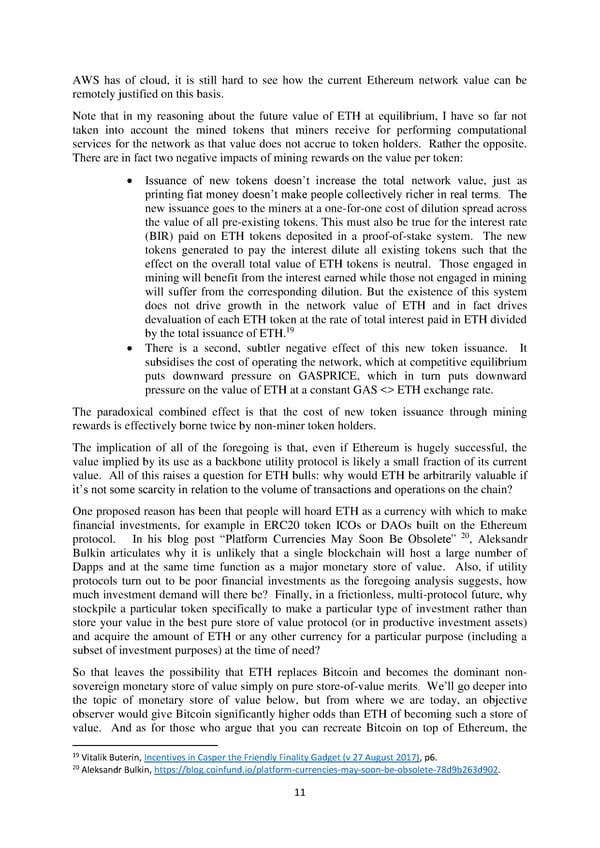AWS has of cloud, it is still hard to see how the current Ethereum network value can be remotely justified on this basis. Note that in my reasoning about the future value of ETH at equilibrium, I have so far not taken into account the mined tokens that miners receive for performing computational services for the network as that value does not accrue to token holders. Rather the opposite. There are in fact two negative impacts of mining rewards on the value per token: • Issuance of new tokens doesn’t increase the total network value, just as printing fiat money doesn’t make people collectively richer in real terms. The new issuance goes to the miners at a one-for-one cost of dilution spread across the value of all pre-existing tokens. This must also be true for the interest rate (BIR) paid on ETH tokens deposited in a proof-of-stake system. The new tokens generated to pay the interest dilute all existing tokens such that the effect on the overall total value of ETH tokens is neutral. Those engaged in mining will benefit from the interest earned while those not engaged in mining will suffer from the corresponding dilution. But the existence of this system does not drive growth in the network value of ETH and in fact drives devaluation of each ETH token at the rate of total interest paid in ETH divided by the total issuance of ETH.19 • There is a second, subtler negative effect of this new token issuance. It subsidises the cost of operating the network, which at competitive equilibrium puts downward pressure on GASPRICE, which in turn puts downward pressure on the value of ETH at a constant GAS <> ETH exchange rate. The paradoxical combined effect is that the cost of new token issuance through mining rewards is effectively borne twice by non-miner token holders. The implication of all of the foregoing is that, even if Ethereum is hugely successful, the value implied by its use as a backbone utility protocol is likely a small fraction of its current value. All of this raises a question for ETH bulls: why would ETH be arbitrarily valuable if it’s not some scarcity in relation to the volume of transactions and operations on the chain? One proposed reason has been that people will hoard ETH as a currency with which to make financial investments, for example in ERC20 token ICOs or DAOs built on the Ethereum 20 protocol. In his blog post “Platform Currencies May Soon Be Obsolete” , Aleksandr Bulkin articulates why it is unlikely that a single blockchain will host a large number of Dapps and at the same time function as a major monetary store of value. Also, if utility protocols turn out to be poor financial investments as the foregoing analysis suggests, how much investment demand will there be? Finally, in a frictionless, multi-protocol future, why stockpile a particular token specifically to make a particular type of investment rather than store your value in the best pure store of value protocol (or in productive investment assets) and acquire the amount of ETH or any other currency for a particular purpose (including a subset of investment purposes) at the time of need? So that leaves the possibility that ETH replaces Bitcoin and becomes the dominant non- sovereign monetary store of value simply on pure store-of-value merits. We’ll go deeper into the topic of monetary store of value below, but from where we are today, an objective observer would give Bitcoin significantly higher odds than ETH of becoming such a store of value. And as for those who argue that you can recreate Bitcoin on top of Ethereum, the 19 Vitalik Buterin, Incentives in Casper the Friendly Finality Gadget (v 27 August 2017), p6. 20 Aleksandr Bulkin, https://blog.coinfund.io/platform-currencies-may-soon-be-obsolete-78d9b263d902. 11
 Investor’s Take on Cryptoassets by John Pfeffer Page 10 Page 12
Investor’s Take on Cryptoassets by John Pfeffer Page 10 Page 12